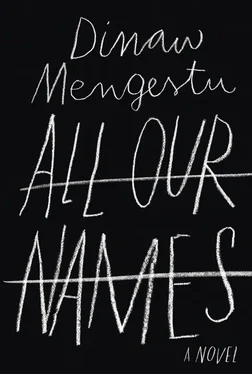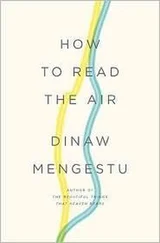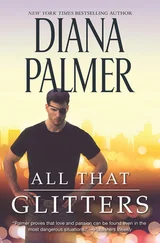“I understood then what he meant by grounded. I sent the package anyway. I hoped to tell him someday he was wrong — that we had made it further than he expected — but it’s okay if that never happens. We are here. We have gone far.”
“That’s what I tell my clients in counseling. I tell them, as long as they’ve done the best they can, they have nothing to apologize for. I say that when they feel guilty or they’re grieving.”
“You don’t have to feel either.”
“Right now I feel both.”
Isaac stood. He took my hands and pulled me up.
“We haven’t walked on the beach yet,” he said. “We came this far. It would be a shame not to.”
The view from the beach was a smaller deception. When I imagined my first walk on one, I pictured a sun setting in the water, but it was the opposite. The sun had already disappeared directly behind us, and we were left with its remains — purple clouds and streaks of orphaned light that did nothing for the water, which looked cold and gray, but made the sky a beautiful place to want to linger in.
We walked to the edge of the sand. There was a soft, shy quality in the way the water barely touched the shore before retreating.
“Is this a better view for you?”
“This is closer to home,” I said. “I’m used to flat. I like to know what’s in front of me.”
Isaac laughed, a genuine, full-bodied one that had him throwing his head back.
“You speak in circles,” he said. It was my turn now to be confused. I assumed that was part of the pleasure for him.
“It’s a bad translation. It’s what my father would say about someone who does not speak directly. They say the clouds are darker when they mean they are tired, or hungry, or lonely.”
“And what do I mean?”
It was a simply question, with an obvious answer. Like most, I wanted to know what came next. Before I met Isaac, I more or less always did.
“It would be bad luck to tell you,” he said.
“Are you making that up?”
“Yes.”
I picked up his hand and began to swing it — gently at first, but then he joined in, and soon our arms were sailing over our heads. We were like birds, but instead of wings we had arms flapping. I knew what we needed to do, whether we stayed in the city or returned to Laurel. We had to invent new rules, phrases, and axioms to live by.
We swung our arms until our shoulders began to hurt. I don’t know how much time went by. It was dark when Isaac asked me what we were doing.
I looked at my feet, and then his. I looked farther down the beach and saw the couples we had followed into the tunnel and, beyond them, the men that Isaac had been watching since we arrived.
“No one can touch us,” I said.
Isaac squeezed my hand.
My plan was wrong. There was an alternate ending that I had been too afraid to consider.
“I won’t leave you here alone,” I said.
“What does that mean?”
“It means I won’t be afraid as long as you are with me.”
I saw myself driving back to Laurel, alone, in a couple of days, and returning to Chicago with suitcases and one or two of those boxes I had hidden away in the basement.
I started to swing our arms again, gently, and then with greater and greater force. I swung them high over our heads, as if we were declaring victory, which I know now we were. We had won and would fight to keep doing so.
As I held our arms in the air, Isaac asked me again: “What are we doing?”
I went back to swinging.
“Don’t you see,” I told him. “We’re taking off. We’re finally becoming ungrounded.”
Isaac and I left the grave, and because I assumed we didn’t have much time left, I took his hand as he stepped down and held on to it as we walked — a habit that had never formed between us in the capital, even though all the young men we had known did so with friends who meant much less to them. I let him lead us off the main road, onto one of the winding footpaths crowded with homes on both sides. At any moment I expected him to stop and abruptly say goodbye, just as he had before, except this time there wouldn’t be a donkey to see me off, and I would go in any direction he wanted me to without arguing.
The paths were deserted. This part of the village was a smaller, more permanent version of the shantytown Isaac and I had met in — the same tight trails with rivulets of fetid water pooling out of them. I had learned my way through such neighborhoods by the voices and smells that came from certain corners. A latrine, a house crowded with children, one that smelled always of food were street signs. I had never been in such close quarters and had nothing to smell. I tried to say something about this to Isaac:
“Where did everyone go?” I said.
He looked around as if he were just now noticing there were no signs of life.
“I like it like this,” he said. “It’s very …” We walked for several moments before he found the word he was looking for. “… peaceful.”
The path we were on gradually curved onto a wider red dirt road that ran along the back end of the town. It was the old market road — built with the village long before there were cars or colonists. I had been on that road twice since we arrived, once by accident, the second time by choice. On both occasions, I had spent the better part of the morning and all of the afternoon watching as the crowd peaked and ebbed according to the village’s particular rhythm. There were thousands of markets like that one across Africa, which was what I wanted to be reminded of when I came the second time. Standing near a vegetable stall, I had written in the first blank page I opened to, “There are hundreds of places exactly like this.” I knew I didn’t really believe that, but I felt better having put those words down. Now that the tightly packed wooden stalls where slabs of meat had hung, and the rugs and mats from which the women sold their vegetables and spare goods were gone, I regretted those words.
I looked for traces of life accidentally left behind — a piece of fruit, a rotting stub of flesh — but everything had been stripped bare and then carefully picked over.
Isaac released my hand. He began to walk among the abandoned stalls, all of which were stained with blood at the base, knocking on every other one as if he suspected that someone was hiding inside.
“Joseph promised us a big feast when we came back. He said we would conquer the town in hours and then return as heroes and eat until there was nothing left.”
He knocked on two more doors.
“He was right about the nothing,” he said.
“Where is he now?”
Isaac pointed to the last pair of stalls.
“Maybe he’s hiding in one of them,” he said.
I thought that was Isaac’s way of saying Joseph was dead. I must have looked relieved at the thought, because just as quickly he added, “He’s fine. He will be here soon.”
It hurt him to say that. He didn’t cringe, but a part of him recoiled. He picked up my hand and locked my three middle fingers in his.
“I want to show you something,” he said.
We walked to the end of the market road; as it climbed, it curved slightly to the right, growing increasingly narrow, until, eventually, it connected back to the paved road that joined the bronze fist to the Life Hotel. We could hear the soldiers before we saw them. We stopped short of where the two roads merged. Isaac whispered into my ear, “Take a look around the corner.” He waited in the shadow of one of the houses while I slipped my head around the bend. Gathered around the fist were all the soldiers I had seen getting off the lorry earlier that morning. They were sitting in a circle; the soldier who had told me to bury the bodies stood next to the fist, talking quietly but passionately, his right hand clenched as he spoke. I described the scene to Isaac, and then waited for an explanation.
Читать дальше












